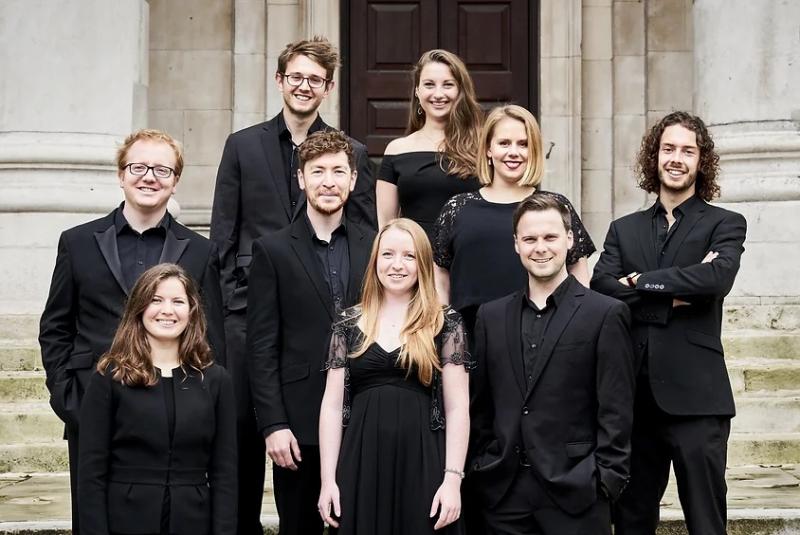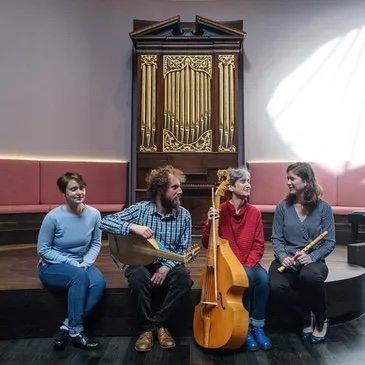Siglo de Oro, Spinacino Consort, Allies, Wigmore Hall review - a fun 17th century musical Christmas | reviews, news & interviews
Siglo de Oro, Spinacino Consort, Allies, Wigmore Hall review - a fun 17th century musical Christmas
Siglo de Oro, Spinacino Consort, Allies, Wigmore Hall review - a fun 17th century musical Christmas
Vibrant historical recreation combines silliness and sincerity

The Wigmore Hall, the high church of Beethoven and Brahms, hosted something less elevated last night: a programme called “Hey for Christmas” presented by vocal ensemble Siglo de Oro and period instrument band Spinacino. The conceit was of recreating a mid-17th century English family’s musical diet through the Christmas season. And it was a whole lot of fun.
As director Patrick Allies explained in his witty introduction, the scenario has traditional music as demanded by the older members of the family, while the teenage daughter is into contemporary dance music – and there is also a starchy uncle demanding some old-fashioned sacred polyphony. (“We all have one.”)
The art of the programming was in blending these different registers in a way that showed them all to their best advantage. The opening instrumental knees-up – the delightfully named “Granny’s Delight”, from John Playford’s celebrated collection The Dancing Master – segued into the traditional “As I rode out this enderes night”. Then a stunning solo number, the Irish tune “The darkest night in December” sung by Hannah Ely with only the lightest of accompaniment from violin and viol (Aarono McGregor and Claire Horáček). Ely’s subtly-inflected tuning and discreet embellishments developed as the piece progressed, warming from a chilly start and then going full circle back to bleak coldness. It was a beautifully judged performance and the highlight of the night.
 Other effective juxtapositions were going from a rich Byrd O Magnum Mysterium to Playford’s “Drive the cold winter away”, one of the handful of items that combined the full instrumental and vocal forces. The instruments of Spinacino (pictured left) formed a so-called “broken” consort, combining bowed strings with theorbo, recorder, percussion and – the wild-card – Callum Armstrong on bagpipes. These were used with judicious restraint, but added a reedy edge to the full-ensemble numbers, and in a promenaded solo spot near the end Armstrong showed the instrument off as capable of generating melodic grace. Also notable was percussionist Tom Hollister, whose sensitive drum and tambourine playing belied his rugby front-row forward appearance.
Other effective juxtapositions were going from a rich Byrd O Magnum Mysterium to Playford’s “Drive the cold winter away”, one of the handful of items that combined the full instrumental and vocal forces. The instruments of Spinacino (pictured left) formed a so-called “broken” consort, combining bowed strings with theorbo, recorder, percussion and – the wild-card – Callum Armstrong on bagpipes. These were used with judicious restraint, but added a reedy edge to the full-ensemble numbers, and in a promenaded solo spot near the end Armstrong showed the instrument off as capable of generating melodic grace. Also notable was percussionist Tom Hollister, whose sensitive drum and tambourine playing belied his rugby front-row forward appearance.
Of the singers, several had solo spots – Rebekah Jones’s “The truth sent from above” saw her in full storytelling mode, accompanied by Eric Thomas’s eloquent lute – and the men combined for a lusty “Sir Christemas”. Patrick Allies directed while singing, with evident enjoyment and collegiality.
Nowhere was this more apparent than in uproarious final ballad, “Hey for Christmas”, where everyone combined in a tale of Christmas debauchery with more “bums” and “buttocks” than perhaps any piece previously heard at the Wigmore Hall. It was a chaotic pantomime that all the players threw themselves into – then brought the house to order with a poised and moving “Auld Lang Syne”.
rating
Explore topics
Share this article
The future of Arts Journalism
You can stop theartsdesk.com closing!
We urgently need financing to survive. Our fundraising drive has thus far raised £49,000 but we need to reach £100,000 or we will be forced to close. Please contribute here: https://gofund.me/c3f6033d
And if you can forward this information to anyone who might assist, we’d be grateful.

Subscribe to theartsdesk.com
Thank you for continuing to read our work on theartsdesk.com. For unlimited access to every article in its entirety, including our archive of more than 15,000 pieces, we're asking for £5 per month or £40 per year. We feel it's a very good deal, and hope you do too.
To take a subscription now simply click here.
And if you're looking for that extra gift for a friend or family member, why not treat them to a theartsdesk.com gift subscription?
more Classical music
 Anja Mittermüller, Richard Fu, Wigmore Hall review - a glorious hall debut
The Austrian mezzo shines - at the age of 22
Anja Mittermüller, Richard Fu, Wigmore Hall review - a glorious hall debut
The Austrian mezzo shines - at the age of 22
 First Person: clarinettist Oliver Pashley on the new horizons of The Hermes Experiment's latest album
Compositions by members of this unusual quartet feature for the first time
First Person: clarinettist Oliver Pashley on the new horizons of The Hermes Experiment's latest album
Compositions by members of this unusual quartet feature for the first time
 Gesualdo Passione, Les Arts Florissants, Amala Dior Company, Barbican review - inspired collaboration excavates the music's humanity
At times it was like watching an anarchic religious procession
Gesualdo Passione, Les Arts Florissants, Amala Dior Company, Barbican review - inspired collaboration excavates the music's humanity
At times it was like watching an anarchic religious procession
 Classical CDs: Camels, concrete and cabaret
An influential American composer's 90th birthday box, plus British piano concertos and a father-and-son duo
Classical CDs: Camels, concrete and cabaret
An influential American composer's 90th birthday box, plus British piano concertos and a father-and-son duo
 Cockerham, Manchester Camerata, Sheen, Martin Harris Centre, Manchester review - re-enacting the dawn of modernism
Two UK premieres added to three miniatures from a seminal event of January 1914
Cockerham, Manchester Camerata, Sheen, Martin Harris Centre, Manchester review - re-enacting the dawn of modernism
Two UK premieres added to three miniatures from a seminal event of January 1914
 Kempf, Brno Philharmonic, Davies, Bridgewater Hall, Manchester review - European tradition meets American jazz
Bouncing Czechs enjoy their Gershwin and Brubeck alongside Janáček and Dvořák
Kempf, Brno Philharmonic, Davies, Bridgewater Hall, Manchester review - European tradition meets American jazz
Bouncing Czechs enjoy their Gershwin and Brubeck alongside Janáček and Dvořák
 Solomon, OAE, Butt, QEH review - daft Biblical whitewashing with great choruses
Even a top soprano and mezzo can’t make this Handel paean wholly convincing
Solomon, OAE, Butt, QEH review - daft Biblical whitewashing with great choruses
Even a top soprano and mezzo can’t make this Handel paean wholly convincing
 Two-Piano Gala, Kings Place review - shining constellations
London Piano Festival curators and illustrious friends entertain and enlighten
Two-Piano Gala, Kings Place review - shining constellations
London Piano Festival curators and illustrious friends entertain and enlighten
 Echo Vocal Ensemble, Latto, Union Chapel review - eclectic choral programme garlanded with dance
Beautiful singing at the heart of an imaginative and stylistically varied concert
Echo Vocal Ensemble, Latto, Union Chapel review - eclectic choral programme garlanded with dance
Beautiful singing at the heart of an imaginative and stylistically varied concert
 Scott, Irish Baroque Orchestra, Whelan, RIAM, Dublin review - towards a Mozart masterpiece
Characteristic joy and enlightenment from this team, but a valveless horn brings problems
Scott, Irish Baroque Orchestra, Whelan, RIAM, Dublin review - towards a Mozart masterpiece
Characteristic joy and enlightenment from this team, but a valveless horn brings problems
 Classical CDs: Voice flutes, flugelhorns and froth
Baroque sonatas, English orchestral music and an emotionally-charged vocal recital
Classical CDs: Voice flutes, flugelhorns and froth
Baroque sonatas, English orchestral music and an emotionally-charged vocal recital

Add comment